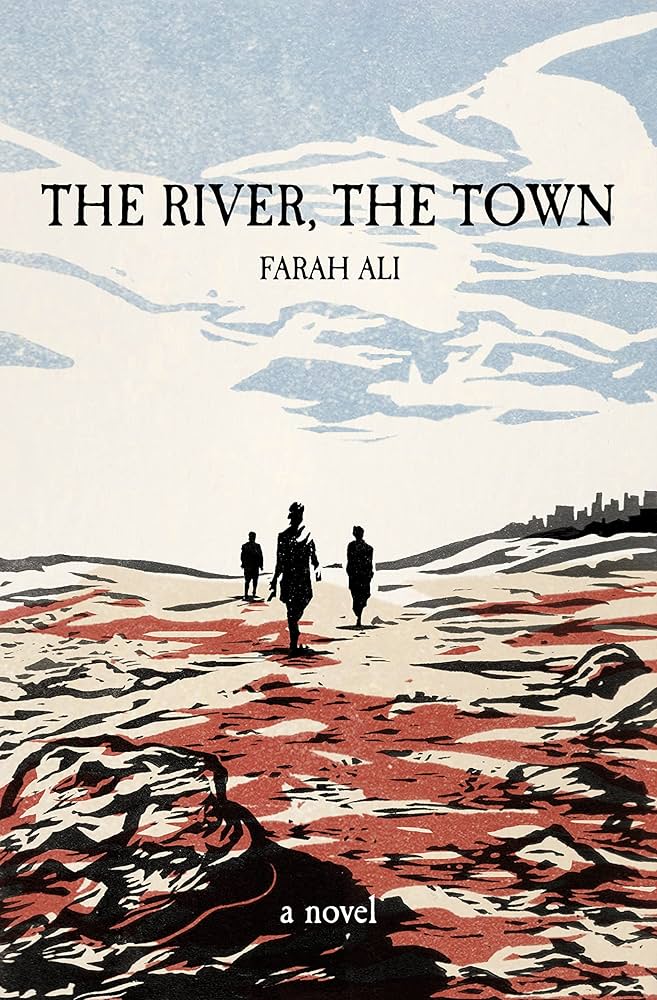
On the cusp of adulthood, Baadal and his two friends get into mischief in their Pakistani Town. They egg the house of a suspicious official. They go to the Town cinema (a home where their friend installed a new VCR). They flirt with nearby City girls, who clock their Town-ness in their brown pants. Baadal says, “The distance between here and the City is only the length of a road but there might as well be a sea in the middle.” Environmental crisis has thinned the Town river to a slow stream, a contrast to the free-flowing taps of the City. Children keep dying. The jobs keep drying up. But Baadal, like most children born in Town, “has been given a name meant to evoke a sensation of coolness, of thirst being quenched.” The Townspeople must “ward off unhappiness, and live.”
In Farah Ali’s debut novel The River, The Town [Dzanc], three members of a Pakistani family narrate a precarious existence between Town and City over three decades. In 1966 Baadal’s mother, Raheela, narrates her Town childhood among beloved siblings, including her little brother’s parakeets. After sudden loss, her family moves to the City, and her life becomes a saga shaped by men, including Baadal. In the late 1990s, Meena sleeps on a bedsheet by the Town river. She lives like a vault of necessary secrets until she finds unexpected solidarity among women. Ali’s gorgeous writing pulls no punches. If you feel breathless at the turns in the plot, The River, The Town is much too beautiful to put down.
The River receives its paperback release in January 2025, Ali’s follow-up to her 2021 short story collection, People Want to Live [McSweeney’s]. Raised in Pakistan and living in London, Ali co-founded Lakeer Magazine and has been awarded the Pushcart Prize and Best Small Fictions. Ali is an alchemist of language, crafting sentences that switchblade her characters’ daily lives into sudden loss. But the novel resists heroizing. Instead Ali asks who humans must become when compressed under devastating force. Her villains are not mustache-twirlers, but privileged gawkers on the sidelines of suffering. When Town-born Raheela dates a City boy, he begs her to describe her meals from Town, specifically the “bad times meals.” Then he brags about not eating for two days, saying, “See, I can live the way you all do.” Soon he cries, “It hurts everywhere,” replenishing himself from a fridge well-stocked with rice. Hunger, for him, was never a real threat. For him, suffering was a spectacle.
When City people move through Town, Ali examines the similar motives behind charity, self-gratification disguised as giving. On one visit, City people offer money from their wallets to the Townspeople but expect a talent show in return on the following day. A young boy says he can spit far. But when he attempts the feat, he cannot work up enough saliva to achieve distance. He asks for a glass of water. The City people usher him off the stage. Even though the real need goes unmet, the City people pat themselves on the back for their charitable contribution.
The difference between Town and City often feels small, as modest as affording mint toothpaste over tooth powder. But Ali writes humans living on the razor’s edge of starvation, with no room for the slightest loss. Every sip of water wasted is an ocean. The result feels dystopian, but The River is a clear-eyed examination of dystopian circumstances that already exist on our planet. No need for speculation or spaceships. This is the reality, looking you square in the face.
Ali favors the people who adapt, shapeshifters who move between spaces by necessity. They must survive wherever they go, whatever the world demands. They live in vacant houses, one-room apartments, on bedsheets by the river. Raheela’s City boyfriend tells her, “You don’t completely look like a girl from the village. You don’t look like you’re from here either. You’re more of an in-between girl.” But when Ali’s characters have a choice, they return to Town, attempting to root down, even in the driest soil. Even though multiple characters dig a well with little result, Raheela dreams of water under the foundation of her house. The River locates a wellspring in ancestry and homeland, honoring the love of place down to its bedrock, without denying the horrors of environmental change. The River, The Town returns to this source again and again, even when all seems lost. Ali’s staggering novel is a tall glass of cool water in a world threatening to harden us all. •
The River, The Town is available now in hardcover and eBook from Dzanc Books. Available in paperback at local bookstores on Jan 14.